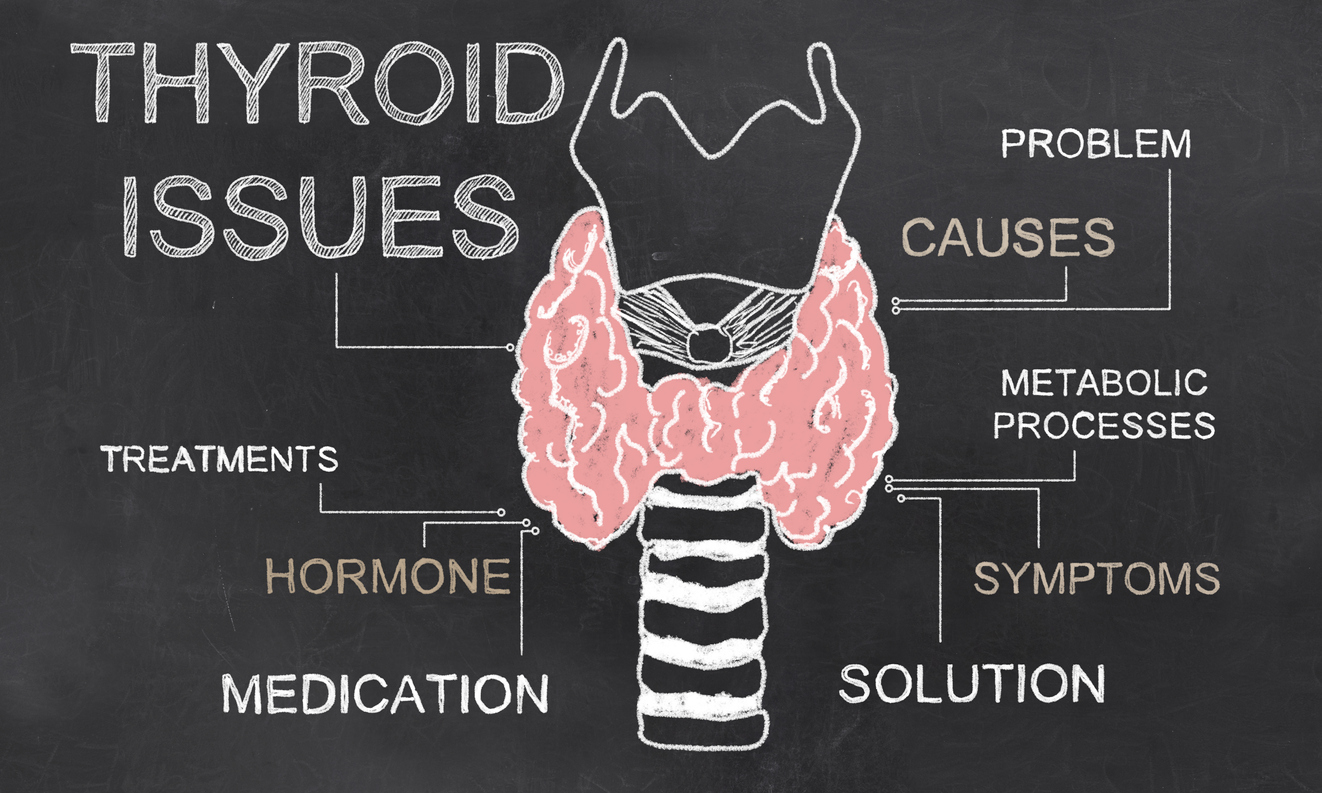
6 Substances that Affect Thyroid Balance
What substances affect thyroid balance?
Meaning of Thyroid Balance
As with everything in life, finding and maintaining balance is largely instrumental in achieving success, happiness, and health. Whether it’s learning to moderate how much time you invest between work and social life, family and friends, fitness and rest, or any other dichotomy, striking a healthy balance between two ends of a spectrum prevents one from prioritizing and grossly neglecting one option over the other.
Just as life throws a series of balancing and juggling acts your way, our physiology also undergoes and experiences biological shifts and imbalances. A few examples, starting with our body’s need for rest, demonstrates that not achieving a healthy balance between sleep and activeness causes cascading effects on one’s wellbeing — cellular recovery diminishes, lethargy and cognitive impairment arise, etc. Another example is the balance between activeness and diet; overconsumption without exercise results in stored cellular energy in the form of weight gain.
The list of balancing biological systems goes on and on, but the point is that imbalances cause extremes in either direction. The common theme amongst the two listed biological examples highlights that point and further emphasizes how fickle our bodies and health can be when we’re not balancing properly. One such imbalance that largely impacts our health is surprisingly contingent on a very small organ — the thyroid gland.
Our thyroid gland, while small, is anything but insignificant in dictating our health. This gland, located in the lower-middle of our necks, produces chemical signallers (hormones) that relay information and instructions that interact with every cell in our body. These thyroid hormones govern how cells utilize energy, how cells produce proteins, and many other processes our organs perform. When the thyroid finds itself imbalanced, meaning the production of too many hormones (hyperthyroidism) or too little (hypothyroidism), then the rest of the body begins to experience major health problems as a direct result.
To best regulate thyroid balance, there are six substances that uniquely interact with the thyroid to help restore and prevent hyper and hypothyroidism symptoms. Read below to learn more about iodine, Selenium, bromine, arsenic, mercury, and sugar.
Iodine
Beginning our list is an essential element for the production of thyroid hormones. Iodine isn’t produced in our bodies, which demands us to supplement this element through our diets to achieve adequate levels.
Sometime before the 1920s, before the mass introduction of iodized salt, many US regions were impacted by iodine deficiencies. As a result of low iodine levels, the thyroid can’t make enough hormones, which often leads to either the enlargement of the thyroid called Goiter (thyroid grows larger to help potentially facilitate more hormone production) or hypothyroidism.
Iodine-deficiency, while always preferable to prevent than treat, can be relatively managed back to normal through diet. Foods like fish and dairy contain adequate levels of iodine to supplement deficiencies. Additionally, the advent of iodized salt from the 1920s is a common-staple amongst households. Lastly, iodine supplements can be consumed to treat deficiency. As an important note, iodine is primarily for conditions affecting the thyroid that doesn’t have enough iodine; iodine supplementation is not advisable for hyperthyroidism conditions.
Selenium
Yet another element, Selenium plays a therapeutical role in managing thyroid diseases. A Selenium deficiency is connected to special proteins that serve as enzymes for catalyzing or transforming T4 (thyroxine) to T3 (triiodothyronine) hormones. When selenium levels are low in the body, the necessary conversion of T4 to T3 is reduced, which causes increased stimulation from an area in the brain; this overstimulation from the hypothalamic-pituitary complex signals key enzymes to ameliorate the reduced thyroid conversion by converting more and more T4 to T3.
As a consequence of the increased conversion of the thyroid hormone, a by-product of this chemical process builds-up in the thyroid leading to damage. Normally, with adequate Selenium levels, thyroid proteins composed of the element that has important antioxidant properties can rid the thyroid of damaging free radicals generated during thyroid hormone production.
Just as with iodine, we can combat selenium deficiencies through diet and supplementation. It’s recommended not to exceed 400 micrograms of Selenium a day; regular selenium consumption is advised to help mitigate thyroid disease risk.
Bromine
Bromine can be found in foods but not as abundantly as previously mentioned elements. The risk of bromine stems from the competition bromine and iodine have within our bodies. Bromine acts as an endocrine disruptor meaning that it competes for the same receptors that iodine tries to bind to.
Over-exposure to bromine in everyday life is a danger to oneself as your body will not hold onto any iodine in favor of prioritizing bromine. This is a risk not only to one’s thyroid but for their entire being as iodine is essential for many, if not all, cells and tissue.
Found in a variety of consumable goods and products, bromine is all around us in our lives. From soft drinks, foods grown with pesticides with bromine, to fire-retardant fabrics and medications. Bromine over-exposure leads to hypothyroidism, which is when the thyroid fails to produce enough thyroid hormones. Furthermore, bromine also leads to bromine toxicity, which has compounding effects on the body like fatigue, skin rashes, arrhythmia, and abdominal pain.
It’s highly recommended to avoid plastics, eat as organically as possible, eliminate soft-drinks with bromide, avoid bromide-fortified flour commonly found in processed breads, and personal-care products free of bromine, or it’s derivatives.
Arsenic
Arsenic is another harmful element, known as a heavy metal, that interferes with thyroid function by competing with Selenium. While Selenium wants to be utilized and bound to selenoproteins within the thyroid, arsenic competes with this binding process. It reduces the readily available amount of selenoprotein antioxidants needed to rinse harmful free radical by-products contained in the thyroid. As mentioned previously, the accumulation of these free radicals is harmful to thyroid tissue.
Arsenic is abundantly found as an environmental toxin often found in groundwater and many products like glass, pigment, textiles, preservatives, etc. Additionally, arsenic can cause adverse health effects like cancer; it’s an element that should be heavily avoided when possible.
Mercury
In a similar fashion to arsenic, mercury is a common (albeit less abundant) occurring heavy metal in the environment. Much of the mercury exposure in our day-to-day lives stem from coal and fossil-fuel emissions. Airborne mercury released this way wind up in water sources, which contaminate and enrich already mercury-dense fish and crustacean.
Mercury is a rather dangerous heavy metal as it doesn’t require much of it to cause toxicity in one form or the other. High doses have been known to cause damage to the nervous system, kidneys, and respiratory system.
With a high affinity for Selenium, mercury also disrupts selenium binding, causing similar issues as arsenic for the thyroid. This can be combatted by introducing more Selenium to outbalance the amount of mercury in one’s body.
Sugar
An innocuous substance that one wouldn’t readily consider as a major culprit to thyroid issues, yet, looks can be deceiving. For those who suffer from the autoimmune disease, Hashimoto’s disease, where the body creates antibodies that target and damage the thyroid, sugar is a real problem.
The introduction of sugar in those afflicted with Hashimoto’s disease reveals that it causes bouts of inflammation in the thyroid and provokes autoimmune flare-ups. While taking medication to manage the disease, one can easily undermine their therapy by unknowingly consuming sugar. It’s paramount for those who recognize they have an autoimmune disease to refrain from sugar; it can lead to issues like ‘Leaky Gut,’ inflame one’s endocrine system, and risk damage to the thyroid from insulin spikes — furthermore, a damaged thyroid struggled at the removal of insulin from the bloodstream which has compounding effects to one’s health atop of everything else the matter.
In Summary
 Having explored these six substances, we see that many substances out there threaten to do more harm than good for our physiology. As specified, there’s an ongoing balancing act occurring in our lives — from a macro-social level to the micro-bio level.
Having explored these six substances, we see that many substances out there threaten to do more harm than good for our physiology. As specified, there’s an ongoing balancing act occurring in our lives — from a macro-social level to the micro-bio level.
It’s of the utmost importance to have struck equilibrium at the biological level as physiological deterioration quickly and noticeably impacts the happiness and wellbeing of our lives at the macro-level. Diminished health impairs our ability to focus on family, friends, work, and interests, which, in itself, can be as detrimental a problem as thyroid imbalances.
Monitor what you’re exposing yourself to; there are many substances out there that can do us harm, and it takes our due diligence to maintain our health. Vitality Aesthetic & Regenerative Medicine recognizes these prevalent struggles and has expert knowledge to identify such problems, such as thyroid issues. If you suspect that you’re experiencing a biological disparity affecting your thyroid balance, don’t hesitate to contact us.


